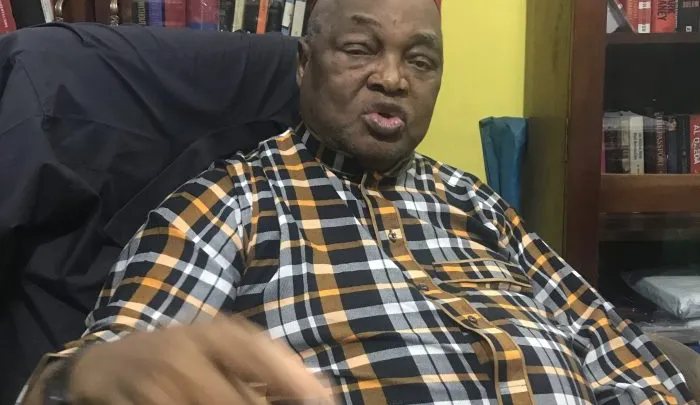Patrick Dele-Cole, renowned politician, journalist, historian, and diplomat, serves on the Editorial Board of The Guardian. He clocked 85 last Monday. Reflecting on his life, career, and the state of the nation, Dele-Cole, who cherishes time spent with his children and grandchildren, speaks with CHUKS NWANNE and KINGSLEY JEREMIAH about the need for Nigerians to unite in building a better country for all.
You are 85. How do you feel about this?
I feel great. I feel that God has been exceptionally kind. I also feel that the values you learn when you’re young: honesty, hard work, respect for others and elders, are like investments. And at this age, you’re beginning to harvest, because people remember. People have been wonderful. Sometimes, of course, they can be nasty. But the lesson you learn when someone is nasty is this, just move on. Don’t waste your time trying to respond or retaliate. Just keep going, because you’re not the one being nasty. That’s their problem, not yours. There are so many doors that have opened up in my life. And to be honest, they didn’t open because of me. They opened because the conditions made it possible.
Looking at the country today, life expectancy is quite low. And yet, you see people like yourself reaching 85, what’s the secret?
Poverty! If material things are not your main pursuit, and you learn contentment, how to deal with what you have, you live longer. And if you have an excellent family, a good wife, wonderful children, and they’ve listened to your guidance and have become successful, that’s a huge blessing. You pray that your children will be better than you, and in my case, that prayer has been answered. They’re all better. They’re all richer. And that’s a good thing. Also, you have to keep your mind constantly working, almost like 20 hours out of a 24-hour day. That helps. And when you live without envy, when you don’t want to be someone else or push them out of their job, you find peace. Even if I work for you, I’m doing my job for you. But what I won’t do is lie for you or tell silly stories. If I work for you and I see you’re not doing what you said you would, I’ll tell you. Saying “no” to the person who employs you isn’t a sin.
It’s a blessing. This is not what we were told. And they say, “But you work for me!” So what? Do you own me? That’s where journalism comes in. That’s the job of journalists, to hold power to account. Every time, say: “Mr. President, this is not what you promised.” If you’re not meeting obligations, own up to it. Say: “Yes, I made this promise, but I don’t have the money to fulfil it now.” Don’t change the subject. Don’t pretend. People love to control the narrative. They want to be called the greatest president ever. I’ve met all the presidents, none of them are perfect. But I know what they said. And I know whether or not they delivered.
So, how did you survive working in government, especially in diplomacy with this mindset?
In the long run, they appreciated it. At the beginning, maybe not. Everyone would be praising them, throwing money around. But I’d sit with them one-on-one and say, “We agreed on this, this, and this. Where is it?” You owe the people a duty to do what you said, especially if it’s ethical and part of your programme. Sometimes the Chief of Staff would ask, “Why are you disturbing Mr. President?” And I’d reply, “Because he is Mr. President, and that’s exactly why I must speak up.” Why shouldn’t I talk to him like that? I don’t win popularity contests. But when I leave, very few people can say I didn’t do what I promised. If I couldn’t do something, I said so. I didn’t lie. Let’s look at pensions. Police officers and civil servants are complaining. People are being pushed into contributory pension schemes. But look, if you’ve already worked for 25 years, and that was the original agreement, why are we asking you to contribute, especially when you’re not even paid enough? The last people who should be on contributory pensions are the police. It’s madness. Maybe government enterprises, yes, commercial agencies and parastatals with different structures and pay scales. But the core civil service? No. You’re a civil servant. You wake up, go to work, come home, and now you’re told to contribute a chunk of your meager salary to a pension that might never pay out? You go home and tell your wife you can’t buy food this weekend because you “contributed”? And yet, even with the contributory pensions, people still end up with nothing at the end of their careers. What’s the point?
Rubio also said that the US would “prevent further issuance to prevent entry into the United States by South Sudanese passport holders.”
Trump’s third-country deportation
The controversial “third-country deportation” policy was formally revived after a US Supreme Court ruling on June 23, 2025, which cleared the legal path for sending deportees to countries other than their own.
The policy allows the US to send deportees to foreign nations other than their own, particularly when the individual’s country of origin refuses to take them back.
According to the Institute for Security Studies, Africa, the US paid El Salvador US$5m in March to incarcerate over 250 Venezuelan deportees accused of gang affiliations, in a maximum-security prison notorious for human rights abuses.
Since then, the Trump administration has expanded this policy to Africa, with recent deportations of individuals from countries such as Vietnam, Jamaica and Yemen to South Sudan and Eswatini.
The Department of Homeland Security justified the decision by saying their home countries refused ‘to take them back.’
What do you think we should do instead?
Well, first: the government is like a household. There are certain basic principles. You don’t spend more than you earn. If the government publishes a budget, the next question should be; how do we fund it? It’s not a document to produce, shelve, and revisit in a year. That’s bad economics. You don’t borrow to pay for basic recurring expenses. Your budget should be based on your revenue capacity. If that capacity isn’t enough, then focus on generating more income. That’s the real problem. We have oil, but it’s not enough. So why aren’t we using that oil to stimulate business, support industry, fund education, and pay civil servants?
I can give you a long list of government waste over the years. In 1979, as the government was leaving office, we had the Ajaokuta Steel project. There were also brick factories in every state, 24 of them, not cement, but brick. We had four functioning refineries. Everything we needed to generate wealth was in place. But we failed to exploit them. And that failure is our eternal shame. It’s not just oil. What about palm produce? Cashew? Cocoa?
We’ve been crying about these things for decades. But when was the last time anyone planted a new cocoa tree? Côte d’Ivoire is now number one in cocoa. We used to be number one or number two. Now we’re nowhere. Malaysia used to get their palm seedlings from Nigeria. Now they’ve overtaken us in palm oil production, something we consume every day. Why don’t we have new palm plantations? Back in the day, our palm produce even supported the soap industry. Whether it was Lux or Kings, they were built on palm oil. When you work in government, the government should provide basic tools, like transport, to help you do your job. Back then, if you worked at the Cabinet Office, you returned the official car at the end of the day and drove home in your own car. The next day, you returned and resumed. But today? If you’re in the National Assembly, the government takes millions of naira and buys you a car. We can’t progress like that.
Growing up, were you worried about long life and success?
Why should I worry? I’ve always had faith that I’d do well. I was at St. Bartholomew School, Asata in Enugu in the early days. I used to walk four to five miles to school. My mother was a midwife and one of the first three then. My father was well educated and they believed in education. I had good training and my parents were willing to continue to pay as long as I passed. After finishing secondary school, I moved on to higher education. I was fortunate to attend good schools, my secondary education was in the East, and my higher education was in the West. I like to think of myself as having been trained across regions.
At one point, I got a scholarship. But I was a bit self-assertive and the scholarship took personal interventions. We sat for the exam and my name was not announced. I went straight to the college’s scholarship officer to ask why I wasn’t shortlisted. There were 18 of us in that class, and I didn’t let arbitrary divisions, like ethnic or regional ones, get in the way. This idea of dividing people by ethnicity? It’s nonsense.
One day, while on my way to watch a football match, someone stopped me. It was the scholarship officer. He gave me a passport and told me I was being sent to university in Iraq. I asked him, “Would you send your son to Iraq?” He immediately asked me to return the passport and travel documents. Later, I met him near the American Embassy in Victoria Island. He called me and handed over travel documents and said that I’d now be going to New Zealand. These things happened. I’m telling you because they reflect how opportunities once existed here. Others probably have even more incredible stories. But my point is; such access to opportunity should be the norm. You shouldn’t finish university and have nothing to show for it, not even a job. When I graduated, job commissions had already started inviting us for interviews even before we finished our national service. Compare that to today. My phone is full of messages from people asking me to introduce them to someone who can help them get a job. The frustration is real. There was even a tragic time when young Nigerians died while jostling for employment during a recruitment exercise.
So, do you think the older generation has failed the youth of today? Why is mass unemployment so persistent? So many young people only thrive once they leave the country. Are you worried about their future?
Absolutely. Let me ask you, how many public servants today would stop to help you like the scholarship officer who helped me? You can’t even get past their messenger. Corruption has become so normalised, it exists even at the lowest levels. The term is public servant, not public master. But today, officials act like overlords. We selected them, yet they treat us like we’re beneath them. That must change. In some parts of the world, things are different. Change has to begin here too.
Do you believe Nigeria will be better?
Yes, I still believe Nigeria can be better. But we need to understand something fundamental; austerity isn’t a bad word. Waste is. And waste is everywhere; financial waste, institutional waste, and moral waste. We borrow billions from institutions like the International Monetary Fund, but for what purpose? What have we done with all the money we’ve already borrowed? Imagine if a president stood up and said: “We’re cutting all these bloated allowances. Salaries will reflect what we can afford. And if I catch anyone taking bribes, they’ll be jailed.” Then he turns to young people and says: “I want you to monitor how every naira is spent, because it’s your future we’re saving.” That moral realignment is what we need. But the tragedy is that when many young people get into power, they act just like those they once criticised.
What’s your take on current political landscape in Nigeria? It feels like governance has been completely abandoned for the next election?
Indeed. After elections, those elected are often surrounded by people who mislead them. It takes immense courage for a leader to say no to bad advice. But the truth is this is that the only person who can save this country is you. If you’re not willing to change, we’ll keep going in circles. You can’t come and praise me and expect I’ll believe you, especially when I know what you’re doing. Yet many in the political class see public office as a career to enrich themselves. We have commissions duplicating functions, but how many actually perform? Instead of reforming broken institutions, we create five more to do the same thing.
We have four refineries, none is working. We’ve created over 130 airlines; how many are still operating? It’s like a revolving door of failure. What drives people in government? Why do they keep doing the same things?
I’ve attended countless meetings, and time after time, it comes down to this; morale and values. We need to teach our children to value honesty and integrity, to develop a conscience, to embrace humility. Look, it shouldn’t take a miracle to get what’s rightfully yours. Systems should be set up so that anyone, regardless of background, can succeed based on merit. When you write an exam, you should know whether or not you did well. That’s how honest systems work. Sadly, things have deteriorated. Young men now see the local government office as the only means to survival, not because they want to serve, but because it offers a chance to access money. Budgets are made, but little trickles down. Then there’s the issue of local governments being undermined. Instead of operating independently, they’re forced into joint accounts with states. What started as a good idea has been corrupted.







